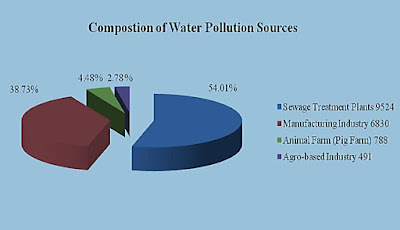Water Pollution - Malaysia

Water pollution is a serious problem in Malaysia. It reduces total water availability considerably. Cost of treating polluted waters increases and some polluted waters are not treatable for human consumption. Urbanization within our river catchments gives rise to an increase in population and urban life activities. Land development increases run-off within a catchment, which in turn affects the water quality of receiving waters. Rainfall in urbanized areas washes down contaminants accumulated on land surfaces into storm water facilities. The main point sources identified are household sullage, sewage treatment plant and industrial area. Besides these, there are other point sources polluting the river basin such as market, restaurant, workshop, resi-dential area, solid waste disposal sites, soil and sand sourcing, new development area, aquaculture, com-mercial lots, petrol station, livesto...
